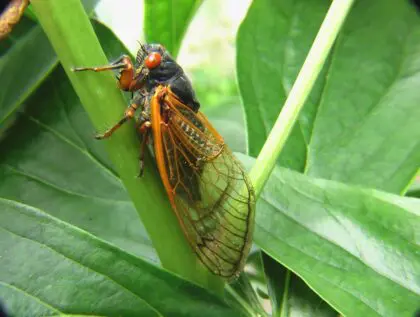 It’s hard to ignore or get away from the constant background noise provided by the cicadas. From late spring to about midsummer, it is the soundtrack we will all have to experience for the time being. Still, you might have questions about them since they only come out every 17 years or so. 2004 was a long time ago, and much about our society, and our world, has changed since then. But the more things change, the more they stay the same. What should you know about the bizarrely charming cicada? Let us tell you more!
It’s hard to ignore or get away from the constant background noise provided by the cicadas. From late spring to about midsummer, it is the soundtrack we will all have to experience for the time being. Still, you might have questions about them since they only come out every 17 years or so. 2004 was a long time ago, and much about our society, and our world, has changed since then. But the more things change, the more they stay the same. What should you know about the bizarrely charming cicada? Let us tell you more!
What Exactly is Brood X?
Brood X, or the Great Eastern Brood, is an umbrella term used by scientists to describe a group of periodical cicadas. While you might see small gatherings of annual cicadas, their periodical cousins are much more dramatic. Mature nymphs come out to play depending on their type – in intervals of either 13 or 17 years. The purpose of this congregation is to mate and die off, but not before leaving behind the next generation of cicadas.
When Will They Quiet Down and Leave?
Every cicada needs the right set of conditions for them to come out of hibernation. For most of them, this means a soil temperature of 64 degrees at 8 inches deep. Warm spring rains can signal them that it’s time to wake up. This trigger means that they come out in mid-May and stick around until the end of June or the beginning of July. After about five weeks, their telltale songs end.
Where Are They Emerging?
It’s easy to assume that every cicada swarm becomes a nuisance for residents of the Mid-Atlantic region. However, this isn’t always the case. Along with Maryland and Washington DC, our noisy guests can be seen in Delaware, Georgia, Illinois, Indiana, Kentucky, Michigan, North Carolina, New Jersey, New York, Ohio, Pennsylvania, Tennessee, Virginia, and West Virginia.
What Do They Sound Like Once They’re Out?
By now, you should be well-acquainted with the raucous sounds every single cicada makes. You can expect their music to sound like a high-pitched electric buzz, a chirp, or a rattle. The males can get as loud as a motorcycle that is 25 feet away from you; female cicadas respond by clicking their wings.
Are They Harmful at All?
Despite their alarming appearance, cicadas are harmless. Unlike mosquitoes, ticks, and other pests, they will not sting, bite, or infect you with some sort of nasty disease. They’re not likely to come inside for a chat and a cup of coffee, either – although they might take up residence on your porch or other unwanted areas. Females busy laying eggs can kill small branches on young, vulnerable trees. The dieback of small branches know as flagging is usually minor will only result in temporary damage to the tree.
On The Green Lawn Care is Here for You!
On The Green Lawn Care is Here for You!
On The Green Inc. was established all the way back in 1994. We started out as a small business that served the local area. In the decades since, though, we’ve expanded tremendously. Incorporation followed in 1997, and our brand has become renowned throughout the state of Maryland. Do you adore social media? Email us at [email protected], call us at 410-695-0444, and find us at our street address: 777 Annapolis Road, Gambrills, Maryland 21054. Come grow with us on Facebook and Google!

